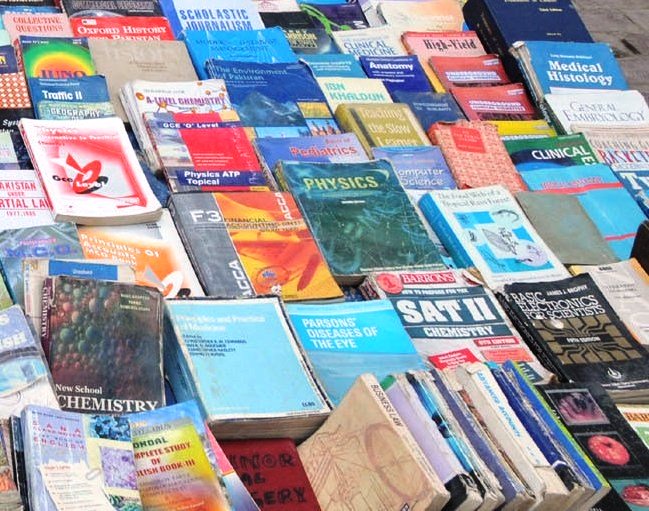
As many as 55 chapters in 22 course books used in Sindh and Punjab were found to contain discriminatory material against minorities, according to a study conducted by the National Commission for Justice and Peace (NCJP).The textbooks were used in grades one to 10 in the 2012-2013 school year.
In a meeting with political parties on the subject of ‘Human Rights Concepts and Religious Freedom’ held on Saturday at a local hotel, NCJP Executive Director Peter Jacob elaborated on the study titled ‘Taleem ya Nafrat ki Aabiyari’ (Education or spreading hate).
Jacob informed participants that 55 chapters of 22 course books contained discriminatory material towards minorities and other countries. He added the books also made insulting remarks against minority religions and distorted historical facts.
Apart from showing evidence of religious biases in school textbooks, NCJP’s study also identified discrimination against the country’s religious minorities in the education policy itself, Jacob said.
No alternatives for studying any faith other than the religion followed by the majority exist. Extra marks are even awarded for showing proficiency in the dominant religious scripture.
“The whole treatment and arrangement of textbooks is visibly discriminatory against non-Muslim citizens of Pakistan,” Jacob stated. “This violates Articles 18, 20, 22 and 25 of the Constitution.”
Comparing the study’s results to previous years, Jacob said an increase in hate-based material in books was recorded in the 2012-2013 academic year in Punjab.
In 2009, there were 45 instances of hate speech found in textbooks and this number increased to 122 in 2013. Most of this material is found in Urdu and Pakistan studies textbooks used in grades seven to 10, he informed.
In Sindh, during the academic years 2009-2011, a total of 11 lessons consisted of hate-based material. In the current year, the number has jumped to 22.
Following Jacob’s address, the political parties’ representatives expressed their parties’ points of view on human rights, religious freedom and reforms in education.
Jamiat Ulema-e-Islam-Fazl Khyber-Pakhtunkhwa (K-P) chapter spokesperson Jalil Jan criticised the West for creating caricatures of Prophet Muhammad (pbuh). He said minorities enjoyed full freedom in Pakistan and his party would try to bring a change in the curriculum to accommodate all faiths.
Awami National Party (ANP) K-P chapter president Senator Afrasiab Khattak said the previous ANP-led government had framed laws to impart primary education in the mother tongue across the province. Extending his congratulations to the newly-elected government, he asked it should concentrate on education.
Underlining the need for reforms in the education sector in general, and curriculum policy in particular, the following recommendations were made by the participants.
Representatives of the Jamaat-e-Islami, Qaumi Watan Party, Pakistan Tehreek-e-Insaf, Pakistan Peoples Party Parliamentarians and Mazdoor Kissan Party were also present at the meeting.
Recommendations
• Education and curriculum policies should be reviewed to incorporate a clear direction for removing lessons and subjects discriminatory towards minority faiths/religions.
• A group of independent historians should be assigned to isolate distorted historical facts in textbooks.
• Subjects other than religious studies should not have lessons and exercises about religion, or should be inclusive of other religions without discrimination and bias.
• Students belonging to other religious groups, who study ethics as a substitute for Islamic studies, should be able to study their own religions.
• No preference should be given in terms of religion and equal treatment of students belonging to all religions should be ensured.
Published in The Express Tribune, May 26th, 2013.
COMMENTS (15)
Comments are moderated and generally will be posted if they are on-topic and not abusive.
For more information, please see our Comments FAQ

1731916090-0/sabrina-(3)1731916090-0-165x106.webp)


1732020599-0/BeFunky-collage-(73)1732020599-0-165x106.webp)






The creator sends us all with an innocent mind but we create a mess out of them in their formalative years. Reap what you sow. I am an Indian punjabi. Poor children of Pakistan are learning fairy tales in their history books. Change the curriculum in history and take help from oxford ...Cambridge...whatever even Wikipedia, they will get a shock when they access the net. Rab rakha
First of all I thank Express Tribune to giving space to such articles which highlight the real problems of Pakistan and I must say that education is the origin of fanatism in the country and only education is the solution to it. No doubt there is hate instigating material in all the pakistani textbooks which started with the printing of Madrassah books in USA to be used in Pakistani madrassas because they were necessary to create Mujahedeen for war against Russia in Afghanistan. This very period created the misunderstanding about "secularism" and "communism", almost all the dictionaries from English into Urdu in Pakistan and Abroad translate these words as "ladiniat" and "kufar" because this is what was necessary to motivate simple muslim youngsters to war against the "big devil" which communism was. (we should keep in mind that the Repubblic of China is a Communist governed State and all our national leaders receive the Chinese authorities with "red ties"). "Secularism" as abscence of religion in the State matter and allowing the religion to be something personal with all its religious freedom and freedom of expression in a State is completely ignored. "Communism" as a struggle of the working-class against the aristocrats, feudals and bringing equal-good to commons is completely put apart. We should remember that the religious minorities in pakistan are not a group protected by Islam and it does not need to be protected, otherwise it would be Dhimma, because the religious minority gave votes to get Punjab in the West Pakistan and Est Pakistan was obtained thanks to the untouchables' vote. NCJP or any individual of any faith in Pakistan have the same dignity as institution and as citizen as anyone else who lives and contributes for the growth of the Nation. Even if it is true that the amendments in the "Constitution" already after Jinnah's death have taken away, the right of being (full) citizen of Pakistan, from all the religious minorities. The Excellent suggestions by NCJP for the change in the Curriculum for sure will contribute in the growth of Pakistan and its citizens towards peace and reciprocal respect.
@ashar:
I thought most of the comment was dishonest, if not delusional, and this sentence highlighted it.
You maybe a Pakistani majority citizen whose prejudiced towards minorities' plight and ignore it. Instead of acknowledging it, you followed the typical defensive mechanism of unrelated and irrelevant illogical hypocritical warped conspiracy deflection to unsuccessfully discredit a true reality. Ask a minority Pakistani, be they Muslim Shia Hazaras or non-Muslim Sindhi Hindus, or even an aware rational, unbiased and honest moderate majority Sunni Muslim Pakistani, and they will tell you discrimination and intolerance against minorities in Pakistan is a large substantial problem.
If everybody is good, it looses its worth and as such there should be bad also and Pakistan is striving hard to produce bad bad bad people with hate mind set. A six year boy is taught in madrassas about jihad, Jenna, killing non-believers and they are now working hard in Pak Afghan borders.
@ashar:
That's where the problem lies. This needs to change. It was not Islamic Republic when Jinnah was alive, this was a later day invention which must be put back.
@Ahmed:
What is Islamic point of view on evolution? When we can't get two mullahs to agree on definition of a Muslim how can we get further than that? I think we should study science as science and keep religion separate.
@awais: Muslims are not blowing them either.
@Ahmed: "Text books being taught at good schools such as BeaconHouse, City School etc contain the ‘Theory of evolution” but not the Islamic point of view on evolution. Why aren’t these people saying that other theories need to be taught aswell. Discrimination needs to be stopped. On all levels and theories."
What exactly is the 'Islamic Theory of Evolution"? Does it have any scientific credence and respectability?
Finally a positive reflection after 65 years.
Yes discriminatory stuff needs to be removed.... Pakistan needs to rejoin the 21 century and be an inclusive place for all communities
@ashar:
yes my chaand, but 'liberals' are not the ones blowing people up
@Ahmed: Yes, and physics textbooks should have a chapter devoted to harnessing jinn energies as well.
Pakistan is an Islamic republic. The curriculum has to reflect this reality. Minorities enjoys full rights in the country while the hue and cry is only a political matter since most of the political parties are backed up from USA or UK or are eying to gain support from the west, try to raise the issue in order to have sympathies of big brothers. Otherwise no where in Pakistan there is any substantial problem with the minorities.
Another problem is with the liberals who know that their recognition in the west depends upon carrying secular or in other words non religious sentiments and an indifferent attitude towards religion is desired to increase their numbers before western elites. This is the reason those who talk about human rights all around the world don't take notice of Burma Muslims, Aafia case, Abu Ghuraib treatment and Iraq massacres. They actually see these incidents with another lens which shows them only one side of the picture. They see the curriculum of Pakistani Schools biased against minorities.
National Commission for Justice and Peace (NCJP) has not significant value and if anything has to be done seriously towards this issue a committee may be formed headed by Justice Mufti Taqu Usmani and his recommendations may be implemented.
Text books being taught at good schools such as BeaconHouse, City School etc contain the 'Theory of evolution" but not the Islamic point of view on evolution. Why aren't these people saying that other theories need to be taught aswell.
Discrimination needs to be stopped. On all levels and theories.
Can they remove "All non believers will go to hell" from their books??